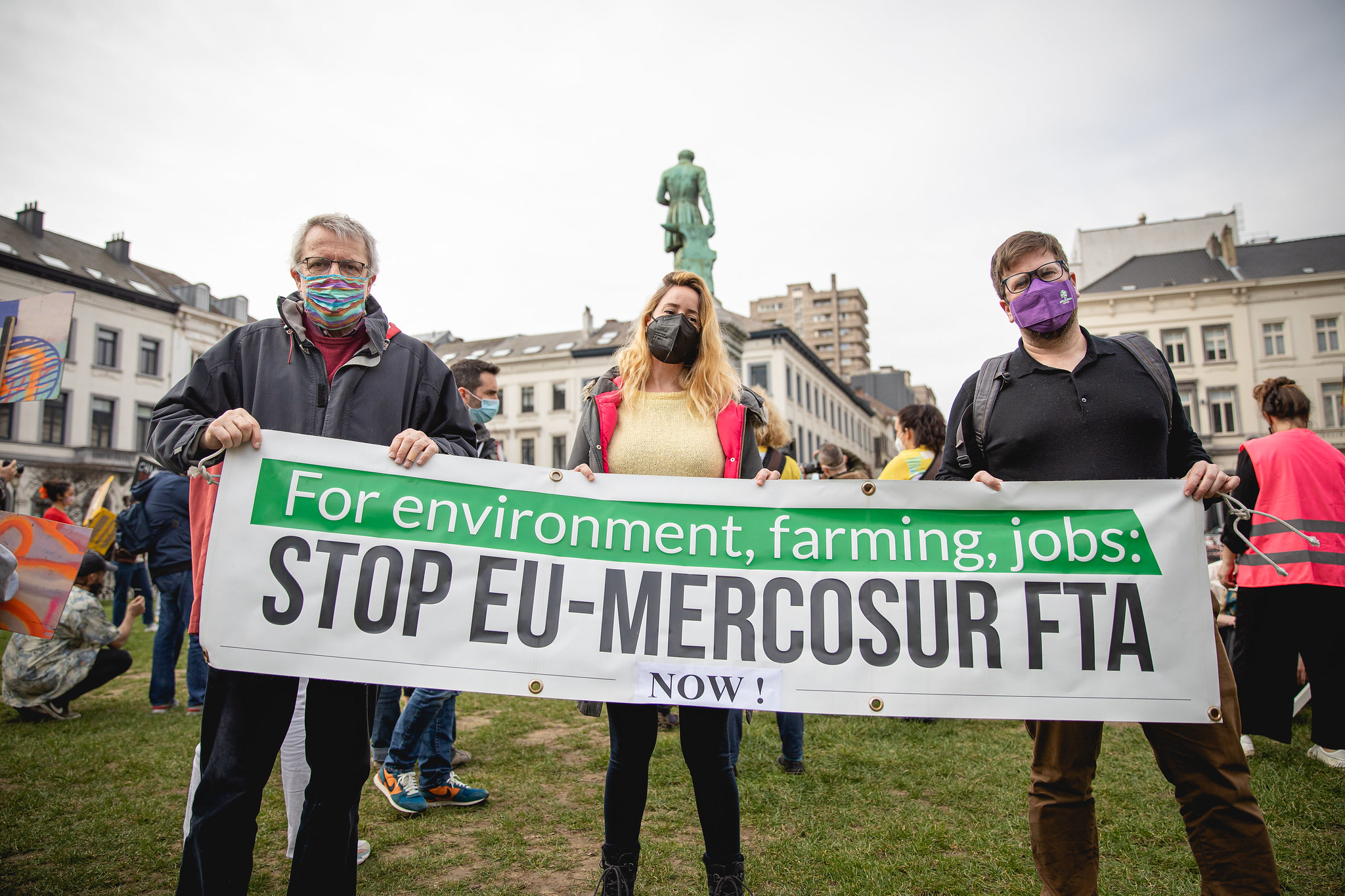Mobility transition slowed down
Anders Handeln | June 2022
Mobility transition slowed down
On the way to a world of climate-justice and for the achievement of the Sustaina- ble Development Goals, we need both a reorientation of trade policy towards the goals of respecting human rights, climate neutrality and preservation of biodiversity, and a mobility transition.
However, present European trade policy favors a fossil fuel, resource-intensive and socially unjust trade system and reinforces a transport system focused on combus- tion engines and individual transport. The upcoming agreement between the EU and the Mercosur countries (Argentina, Brazil, Paraguay, Uruguay) exemplifies a retrograde mobility and trade policy in which the automotive lobby sees its interests disproportionately well represented, thereby undermining effective climate and human rights protection.
The study “Mobility transition slowed down. The EU-Mercosur Agreement and the Automotive Industry” shows which concessions the EU Commission has made to the automotive lobby while disregarding the environment, climate protection and human rights, in order to increase the profits of the European car industry.
The key findings of the study are:
ʇ Not only did the automotive industry and its associations engage in intensive lobbying, also the German Ministry of Economics proactively approached the auto- motive industry to ask for its wishes and feed them into the agreement.
ʇ As a result, extremely profitable elements of the agreement emerged for the European automotive industry, such as the elimination of tariffs on cars, car parts, mineral raw materials, and the promo- tion of exports of agrofuels based on soy or sugar cane.
ʇ In the long term, the agreement would secure a lucrative sales market for climate-damaging combustion engines for car manufacturers and thus stand in the way of a gradual shift away from fossil- fuel-powered private transport. As a re- sult, the European automotive industry can continue to reap huge profits with its fossil-fuel car models in Mercosur at the expense of the climate, while at the same time generously proclaiming the end of combustion engines in the EU. The agree- ment thus weakens efforts to reduce emis- sions from the global car fleet as a whole and promotes false solutions such as the use of agrofuels.
ʇ Agrofuels are more damaging to the climate than fossil fuels because they
release large amounts of greenhouse gases through land-use changes. The agreement would further strengthen agrofuels through a planned addition- al 200,000 tons of tax-favored bioetha- nol, duty-free imports of biodiesel, and a reduction in Argentina’s export taxes on soy (oil). The huge areas of land occupied for agrofuel production are also no longer available for food and feed crops, driving up their cost, which would further fuel the global food crisis that is already worsening due to the Ukraine crisis.
ʇ Tariff reductions for mineral raw materials would help secure and make cheaper the supply of raw materials to the automotive industry. This applies in par- ticular to iron, steel, copper, lithium and various other processed raw materials. However, the associated mining activities cause numerous human rights violations and conflicts with local communities and indigenous groups, particularly in Argenti- na and Brazil.
ʇ Through tariff reductions, the agree- ment also increases the demand for cow leather, which the European automotive industry uses for the production of leather seats.
ʇ The rapid tariff reduction on cars and car parts, as well as the rules of origin, would increase competitive pressure, es- pecially on the Mercosur automotive in- dustry. This endangers jobs in this region and reinforces the trend toward precari- ous employment.
ʇ These short-term economic benefits for the automotive industry stand in contrast to very weak environmental, social and hu- man rights provisions in the agreement. These include, above all, the sustainability chapter that does not foresee any sanc- tions, the lack of a concretization of The Paris Agreement, and the lack of effective rules on corporate due diligence or de- forestation-free supply chains.
ʇ Due to weak risk prevention instruments, the agreement makes it difficult to regulate the automotive industry in a socio- ecological way. By favoring the automo- tive industry, it also hinders the necessary mobility turnaround, such as measures to avoid traffic and to reduce motorized indi- vidual transport in favor of public transport.
Key recommendations:
The considerable influence that the European automotive industry was able to exert on the EU-Mercosur agreement underscores the urgency of a far-reaching reform of EU trade policy. An agreement that bears the signature of the automo- tive industry in such a clear way should not be ratified. The preservation of liveli- hoods, respect for planetary boundaries and globally equitable access to goods and services must be the foundation of sustainable trade relations. Only with a fundamental change in trade policy and a socially as well as ecologically just mobility transition can we meet these challenges and promote a good life for all.
Outlook:
Already in 2019 the EU wanted to sign the agreement. After many different civil soci- ety groups and alliances on both sides of the Atlantic voiced criticism and individual governments and parliaments announced that they will not approve the agreement in its current form, the supporters are in a “rescue phase”. We can expect concrete proposals for an additional instrument be- fore the end of 2022, which sounds nice on paper but will not change the funda- mental problems and mechanisms of the agreement.
Therefore, it is important to discuss the connections between car lobbyism, fossil-fuelled mobility and trade policy in our movements for a just trade policy, cli- mate justice and a mobility turnaround, and to publicly reinforce our criticism.






